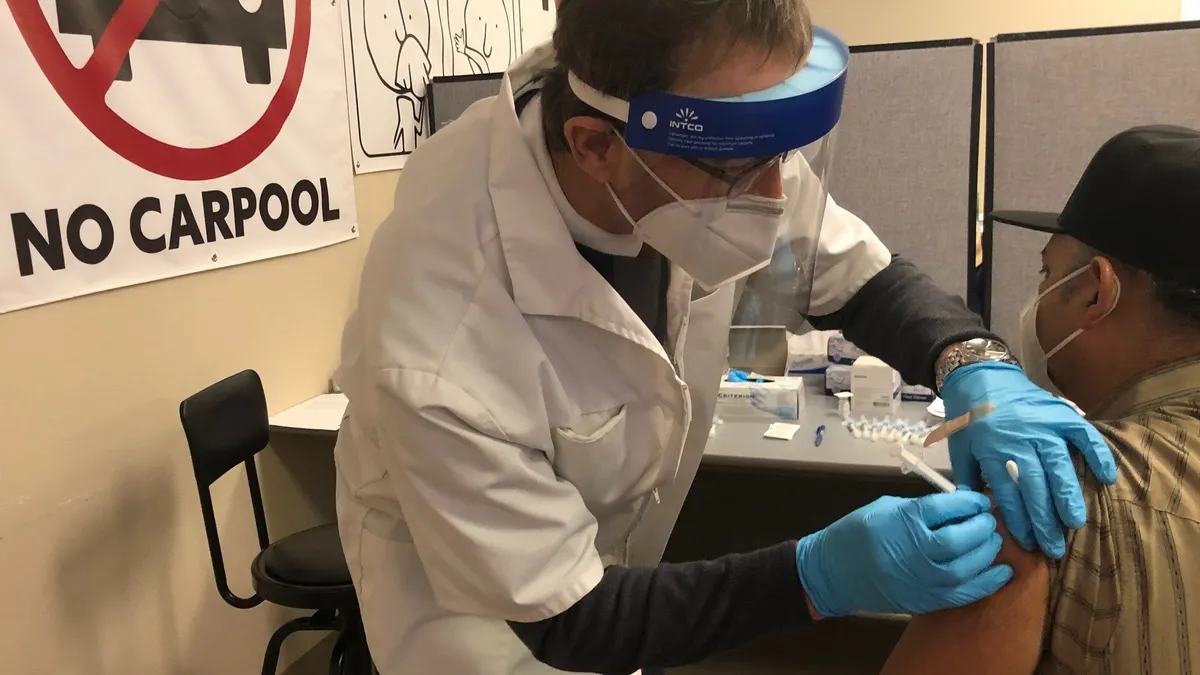Dive Brief:
- Cities where residents interact more with their local government's official social media channels have less negative sentiment around coronavirus vaccines, according to research published last week.
- While social-media and local-media interactions with official communications from local governments were only 19% of online discourse around the vaccines, they typically had a positive effect overall, the report found. Researchers analyzed 3.5 million online interactions in 18 cities in the United States and received 8,700 responses to resident surveys in those cities. Conducting the research were resident feedback analysis company ZenCity in collaboration with Professor Stephen Goldsmith at the Harvard Kennedy School's Ash Center for Democratic Governance and Innovation and civic sector management consultants Bennett Midland.
- At the time of the survey, which was conducted in March 2021, 60% of respondents said they had not been vaccinated. Of those, 28% said they would never take the vaccine, 46% were unsure or wanted to wait, and 26% said they would take it as soon as possible. Misinformation was a key driver of vaccine hesitancy, according to the report, while a convenient process and life returning to normal were key motivators for getting vaccinated.
Dive Insight:
After some initial bumps in the road, COVID-19 vaccine rollout has accelerated across the United States, as have rollbacks of certain public health measures. But city leaders worry that some residents remain hesitant to take the vaccine.
ZenCity found that 47% of those surveyed are hesitant to receive the vaccine as they believe they are at a low personal risk from COVID-19, while 46% have concerns about the vaccines' effectiveness and another 46% have concerns about side effects. Those figures are higher among Black and Latinx populations, with 61% of respondents in each of those groups feeling they are at low risk from COVID-19 and around 60% or more worried about the vaccines' side effects or effectiveness.
While roughly 30% of city residents are unsure if they want the vaccine, they can be convinced otherwise with the right kind of targeted messaging, said Eyal Feder-Levy, ZenCity co-founder and CEO, during a webinar last week to mark the report's release. Prior to the availability of vaccines, cities already saw success with targeted messaging around the coronavirus, with the likes of Gilbert, Arizona, embracing a heavy online presence to keep residents informed.
Community leaders are a crucial vessel for communications around getting vaccinated, New Orleans Mayor LaToya Cantrell said during the webinar. The city has worked with faith leaders, beauticians and barbers, as well as local musicians and social media influencers to get the word out, she said.
"It's a different approach than offering a gift card for folks to roll up their sleeve," Cantrell said. "We just keep engaging our residents to show them the value of getting vaccinated."
Newark, New Jersey, Mayor Ras Baraka said the city has made use of Facebook Live to regularly have video chats and question-and-answer sessions to try and address misinformation and hesitancy around the vaccines. But he also said it has been critical to have pop-up vaccine clinics in neighborhoods and local communities, which can be less intimidating for reluctant vaccine recipients.
"In the beginning, the state and the county and all these folks set up these huge sites expecting that people would be coming to those sites, but if you're hesitant, you're not going to catch a bus, register and wait in line for something that you're hesitant about," Baraka said. "So we had to make it available to them.”
Cantrell said giving people incentives to get vaccinated can also be an effective strategy. She noted the start of the new NFL season is just months away, and fans being vaccinated will be a key way to help ensure more people can watch New Orleans Saints games in person this year.
"I am saying if you want to be in the [Superdome stadium] in September, it is contingent on you being vaccinated," Cantrell said.
Baraka said the coming months will need an "all hands on deck" approach to get more vaccines in residents’ arms. New Orleans will "double down" on its current strategy, Cantrell said, and pivot to new initiatives where necessary, all in a bid to restore a semblance of normalcy to everyday life.












